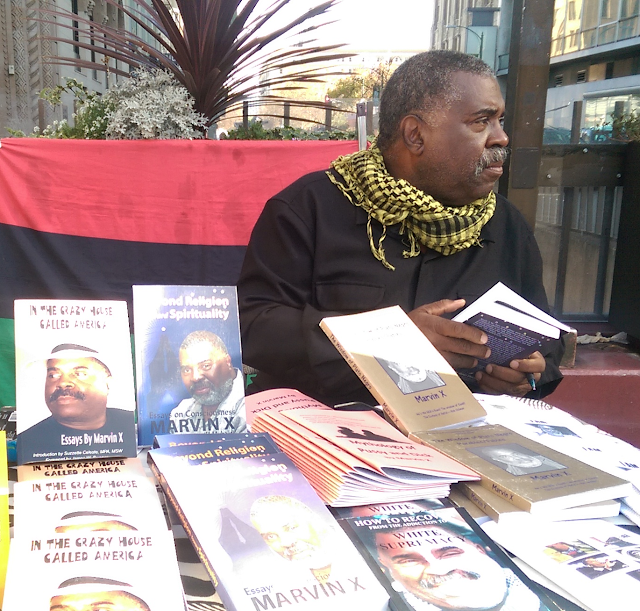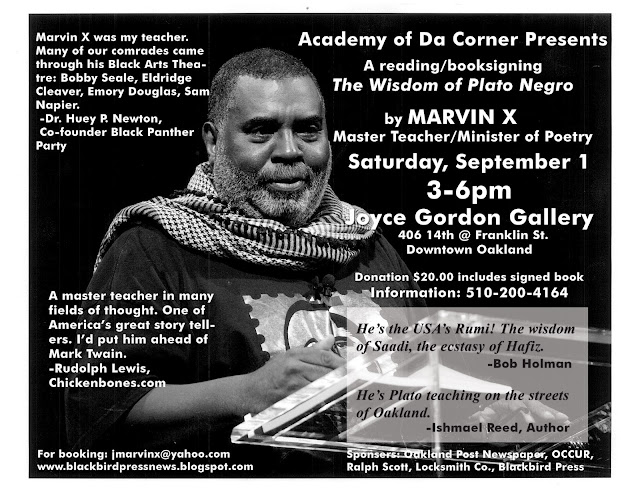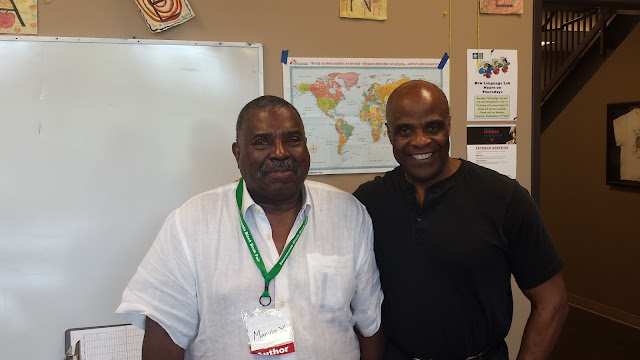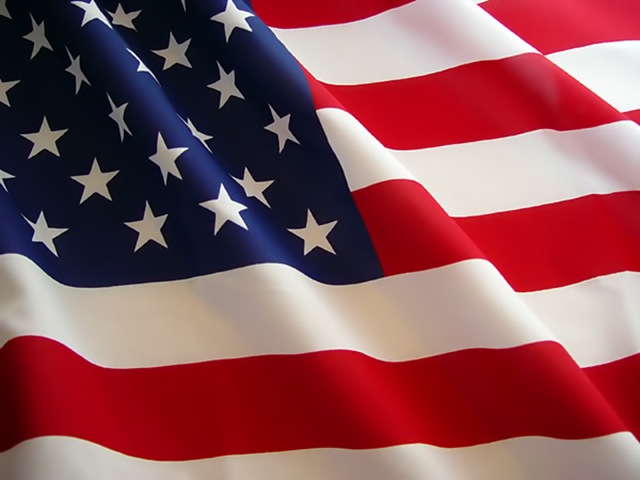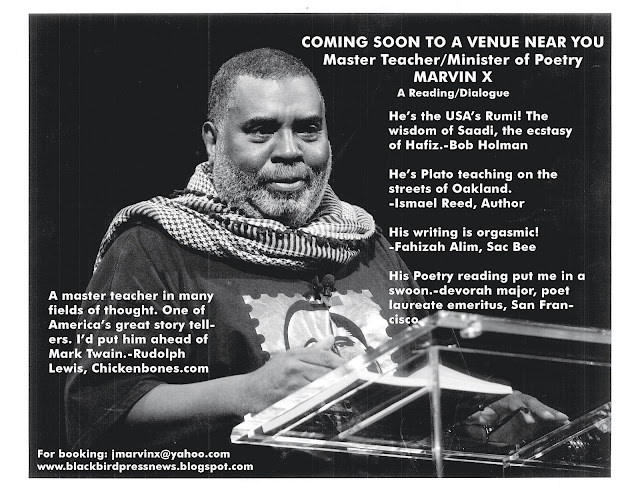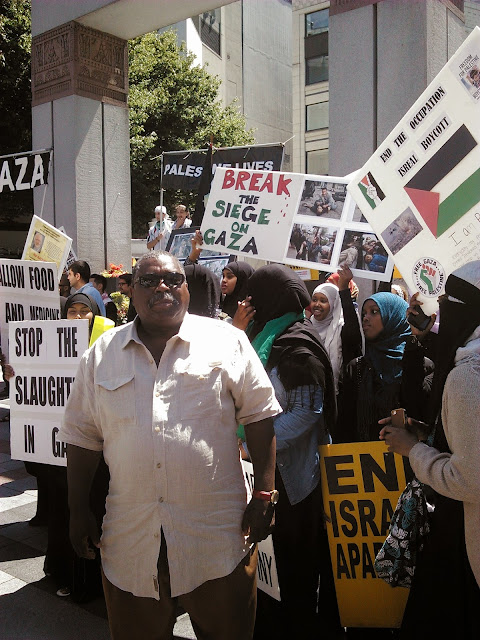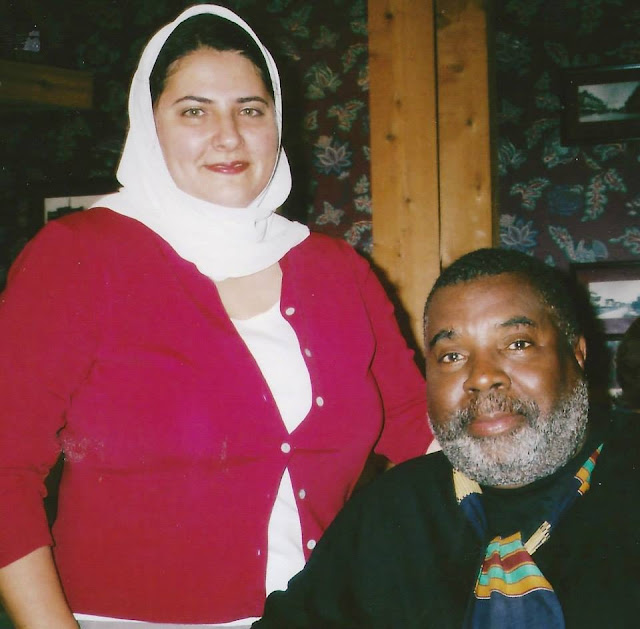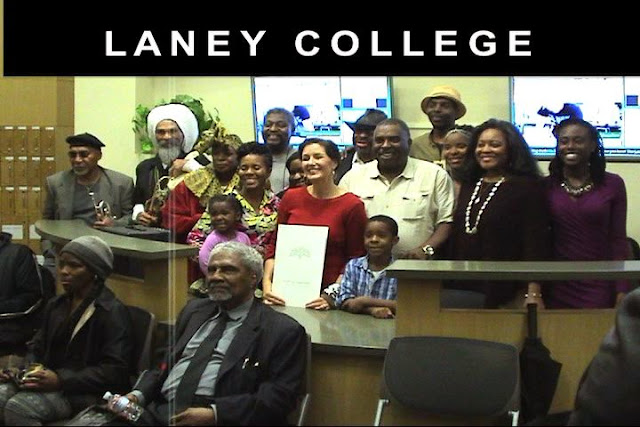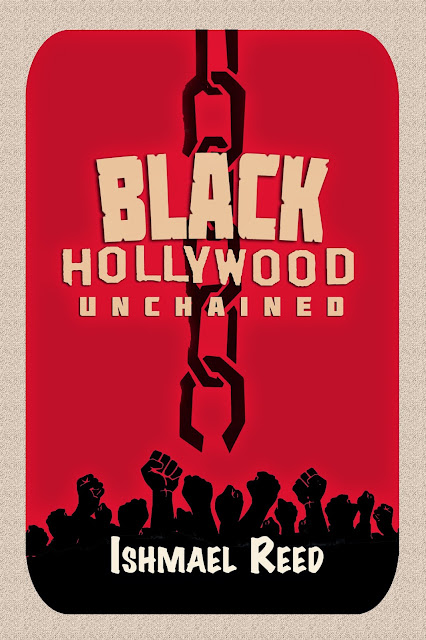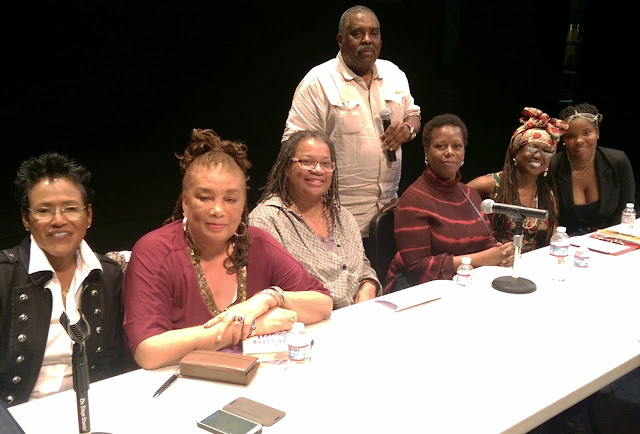I've been listening to
Wish I, a CD of
an interview of Marvin X on KPOO-Radio in San Francisco. Though
I been checking out Marvin for a season I never been with him in
the flesh and never heard his voice except on the page, and in
cyber-communications. And from reports by Kalamu ya Salaam. The
Wish
I CD affirmed how I imagined him and how I tried to
characterize him in my review of his book of poetry,
Land of My Daughters.
Funny, outrageous, challenging Marvin X is on
the same tier as Amiri Baraka and Kalamu ya Salaam in putting on
an entertaining program. For in "Why I Love
Lesbians," Marvin says, "In their hatred is
drama / I love drama." Marvin's first love is theater; he
is poet and shaman, skilled in manipulating the passions
like the preacher in the pulpit, or the Harlem soapbox
orator, or the barbershop orators found throughout the black
community. In his Wish I Could Tell You the Truth--Essays,
Marvin X has created a book that mirrors the orature in bull
sessions, ubiquitous in black speech and poetry, in the
barbershop.
That is, Malcolm X ain't got nothing on Marvin X. Still
Marvin has been ignored and silenced like Malcolm would be
ignored and silenced if he had lived on into the Now. Marvin's one
of the most extraordinary, exciting black intellectuals living
today--writing, publishing, performing with Sun Ra musicians,
reciting, filming, he's ever engaging, challenging the
respectable and the comfortable. He like Malcolm dares to say
things, fearlessly, in the open (in earshot of the white man)
that so many Negroes feel and think and speak on the corner, in
the barbershops and urban streets of black America.
Discourse by exaggeration and humor has its place in serious
intellectual enquiry. Everybody don't have to wear the nerdy
mask and inky cloak and speak in the autocratic tones of
academia. Marvin's dramatic style and political approach could
not be tolerated at the University since Ronald Reagan forced
him out of the California university system, which signaled the
castration of black studies at white universities.
In short, Wish I Could Tell You the Truth is
one of the most daring, innovative, entertaining group of
"essays" I ever had yet to read. In a true sense this
book is a literary replication of the barbershop experience. The
street rap. Yet much more sophisticated, informed, daring,
philosophical. And it is sheer arrogance and snootiness that he
has been ignored or overlooked by PBS, CNN, and FOX. And by
black literary societies and colleges. Because his thinking is dangerous, and
his simple courage is infectious. And anybody who's heard him
know that Chris Rock and Amiri Baraka ain't got nothing on
Marvin, once he gets to improvising. Marvin is a truth teller,
and just as funky as James Brown.
Wish I Could Tell You the Truth is,
too, an intellectual and philosophical autobiography. Boswell
has nothing on this journalistic foray, that sweeps the
planet in its thinking. Marvin is a storyteller. Like Abby
Lincoln, Marvin's voice matches the story he tells. He ain't no
Cornel West. With Marvin you cannot separate the story from the
voice, one reinforces the other. Though everyday speech is in
Marvin's writing, his writing is artistic writing and different
from his oral performances. Marvin is no linear thinker and so
you have to take him in in the all in all, between the covers, you
got to read him fully to appreciate truly what he has achieved
as an artist and as a man.
The tone of Wish I Could Tell You the Truth
is established in a forty-page autobiographical note beginning
with his birth during an age of war, the impact of broken family
life, youthful love, exposés, going on to his academic career, antiwar
activism, criminal on the run, hustler, civic reformer, and
revolutionary. This autobiographical section is primarily
episodic and expressionistic rather than linear and analytical.
It is Marvin's expertise as storyteller that carries us forward
for his views are often surprising and shocking. Marvin don't
pull no punches when lives are involved.
"Negroes see me and they get on a
skateboard," Marvin observes. "I don't have no
money, I ain't got no bank account, I ain't got no job, and I
ain't had no job in twenty five years, you understand, I
don't have no power but the word, and Negroes run from
me, scare to death, they scared, Mama . . . but they ain't scared of
doing whatever the white man tells him. Going to Iraq, dying like
flies . . . won't die for a purpose. . . . dying on the streets
of America. . . . for no purpose, at all . . . they learn all
this from the white man, really. Because that's how they think.
Bush think there ain't no consequence to his actions. . . Bush always needs another
cowboy . . . but he don't understand . . . the Indians are
coming . . . THE INDIANS ARE COMING . . . they coming for you . . . the
Ancestor Spirits of the Black Man and Woman are coming for you,
Mr. White Man, unless you clean up. . . . you understand."
Now this kind of speech scares Black Academia
in the company of their white colleagues. And the white
professional does not want to endure his female colleagues
squeamish in their chairs because of Marvin's voice. But Marvin is a radical advocate of
free speech, "Don't sell me no sheetrock, for my pipe. . .
. Give me some love, give me some truth. It does not matter
whether you black or white . . . the weapon of today is
consciousness, not color . . . we been trained to be warriors .
. . God was training us for war . . . but they [we] don't have
the right word, the right directions . . . turning them into
constitutional slaves."
Well this kind of nationalist speech would
make a
Martin Kilsonsquirm. There's no place in the academy and black
studies programs for nationalists like a Marvin X or an Amiri
Baraka or a Kalamu ya Salaam. Three of the most extraordinary
men (writers, artists) of our time alienated, separated, barred
from the Academy, and the "accepted" (the
"pragmatic activists") embarrassed by their presence and
speech.
In his response to Reverend Eugene Rivers'
"Beyond
the Nationalism of Fools: Toward An Agenda for Black
Intellectuals" (Boston Review), Kilson argued we don't need "a
new-mode Black nationalist discourse issue . . . . For me, all
variants of Black nationalist modalities have spent-their-load,
as it were, whether here in US, in the Caribbean, or in the many
African states where it is fully bankrupt." So Marvin has
nothing a Kilson can respect, unworthy of his intellectual
attention or recommendation.
Marvin
and Baraka have "spent their load"!!! Is that the real
deal? Or just the Academic Black Ball. But this kind of autocracy
within black political discourse and acts and educational arenas
should have been dispensed with yesterday. Here's a matter in
need of serious consideration. If the Du Bois Chair at Harvard
is going to be the Chair for Black Humanities and the
political, social, and cultural arbiter of Black Life and
Culture, shouldn't we black folks have something to say who sits
in the Chair?
Baraka
had more books, more scholarship than Skip Gates, more
organizational skills, he was more representative of the sentiments of
black youth and Du Bois, an activist scholar, par excellence.
But we didn't have a hand in it, we folk, because white money is more
persuasive, than dedication and sacrifice, and even community shaming. If
we were truly a nation we could by vote choose our
representatives and leaders. We wouldn't have to wait for good
white people to choose them. Let's vote for our Idol.
So
Marvin writes: "The activist scholars were long ago removed
from academia as a threat to Western scholarship and community
liberation. Safe, qualified negroes were brought in who would
control the natives and have them chasing rocks in Egypt rather
than stopping gunshots in the hood by providing alternative
consciousness. . . . Black studies was not about degrees, but
the liberation of a people . . . . the community would be better
served giving consciousness to dry bones in the hood."
But
Strong Men keep on pushing, despite isolation, alienation, and
banishment. There ain't no stopping Strong Men, says Sterling
Brown. And Marvin is a nationalist with a global consciousness.
But our primary "mission is self and community development,
not esoteric journeys to the Motherland to discover much to his
dismay and utter disappointment that he is not an African but a
pitiful American mutation, a mongrel, in short, a white man in
black face, a disconnected descendant, even worse than ET
because he can't call home even when he gets there."
But
it is "even more important that he makes peace with the
trees and swamps and bayous of Mississippi, Alabama and
Louisiana, then perhaps the ancestors in Africa will accept him
and assuage his mind . . . better . . . connect with the ghetto
blacks he . . . earnestly desires to escape." We are schizophrenic
(you know, Du Bois' "double consciousness"). Negroes
"got ten different personalities . . . negroes know
how to act. . . Tom was a killer, he
had murder in his heart." So for the dope gangs, we
need to "make peace with them, teach them to make peace
with themselves." But we also have too many black
celebrities, like Crouch, Cosby, and West, "cultural police
for the black bourgeoise," destructively "Beyond the
Ignorance Zone."
So, you see, Marvin is refreshing. He's a
Liberator. He has freed up contemporary black public speech,
primarily controlled by the hip hop industry, Hollywood, the
communication industry, and educational factories like Harvard
and black public schools. He's like no Muslim you have heard
speak. And this is odd for the usual impulse is to think of
Muslims as limiting speech and especially the speech of women.
For he knows the "light don't come on if you don't turn the
switch. . . . Flip the switch on, dummy . . . you got to put on the
armor of God and you can walk through the valley of shadow and
death. . . . I had the armor of God on me when I was
out there, when I was out there in the projects, on crack."
War, religion, and cultural ethics are the
steak of Marvin's extended discussion. Wish I Could Tell You
the Truth is thus cultural criticism at its best. "In
the Name of Love," Marvin explains, "Love ain't love
if it cuts too deep." For many Marvin probably cuts
"too deep." It's a book that would frighten a Tavis
Smiley or a Jesse Jackson or a Skip Gates. Though he says he's a
Muslim, on reading Marvin you can only guess he is a Muslim. He
don't pray five times a day and he don't ascribe to some of
the cultural practices of some Muslims and thus he has made a
call for a "Radical
Spirituality."
The slave religion cultivated by black
mega-preachers and Saudi-supported Islam are better understood
as a "religion box." Marvin continues, "But we
know the people have been hoodwinked and bamboozled, therefore
it is the mission of the truly spiritually conscious to step to
the front of the line and represent, not hide in the closet and
let the masquerade continue." Marvin is wary of religious
institutions that exist for the priests primarily. "We have
been told to seek ye first the kingdom of heaven and all things,
yea, even political and economic things will be added unto
ye."
Marvin is against imperialist wars, e.g. Iraq
and Haiti. He was a Vietnam-era anti-war activist on the run,
from Canada to Central America. And he takes position on Israel
that no black academic would dare take, no black elected
official would allow pass through his lips. "Israel is the
number one problem in the Middle East. Israel is no less a
fascist, nazi, apartheid state backed with the money and
armaments of America. Israel is the only threat to peace in the
Middle East."
Whether Israel is the "only threat"
my political sympathies do not extend so far. What's troubling
is Israel is beyond criticism, if you want to win public office
in America. And our 800 public black officials and academicians
know how their bread is buttered. And as it used to be with our
black mayors, there is no full criticism, but rather a mumbling,
hypocritical silence. Nationalism is okay for the Jew, but not
the American Negro, for they ain't got no guns and capital, and
certainly, thank God, they ain't nuclear.
So in the spirit of Marvin I'm gonna call on
and thank God, Allah, Jesus, Jah, Jehovah, Buddha, Karl Marx,
and Lenin, and call on the Ancestors to bless you with a copy
of Wish I Could Tell You the Truth. Don't run from
Marvin, give him an ear. The brother got truths you need to hear, that will
clean us up. Liberate the captive. Build a new black world, real
free zones. And he's got some lies, too, but it's all good.
Contrary to Kilson's view, life is still in black nationalism. For
Marvin Black is White and White is Black. He ain't fearing being fired, he says what he wants to say.
. . . Praise God in the name of Love.
Note: Wish I Could Tell You The Truth is out of print.
*
* * * *
Wish I Could Tell You the Truth
Essays by Marvin X
Contents
|
|
|
|
| Chapter One: Tale of an Angry Old Man |
12
|
|
|
| Chapter Two:
Manifesto of The University of Poetry |
52
|
|
|
| Chapter Three:
Toward A Radical Spirituality
|
73
|
| In Search of my Soul Sister |
75
|
| Terrorism in the World Post 9/11 |
83
|
| On Cecil's Brown's "What Happened to My Black
Studies?" |
84
|
| Has Nature Turned Against America? |
87
|
| America, the Fire This Time |
89
|
| Black Studies, Treading Water |
90
|
| Beyond the Ignorance Zone |
91
|
| Bush, Last American Tragedy |
92
|
|
Farrakhan's Final Call |
94
|
| Mass Murder in the Middle East and the Peace
Movement |
95
|
| Michael Rode His Boat Ashore |
97
|
| Minister of Poetry Brings Tears to Sacramento |
97
|
| MMinister
of Poetry Replies to Dr. Julia Hare |
99
|
| War in Iraq |
100
|
| Of Spiritual Things |
104
|
|
|
| Chapter Four:
Crazy House of the Negro Book Tour |
107
|
| Open Letter to the Poets of Detroit |
109
|
| Human Earthquake Rocks New York City |
110
|
| Marvin X, Sonia Sanchez and the Crazy House Band |
112
|
| Live in Philly at Warm Daddies |
113
|
| Speaks to the Gullah Nation, South Carolina |
114
|
| Human Earthquake Hits Houston, Texas |
116
|
| Call for General Strike at Reparation Rally |
118
|
|
|
| Chapter Five: Of Myth and Rituals |
121
|
| Hero/Shero Defined |
123
|
|
Islam Needs a Martin Luther |
124
|
| End of World Innocence |
127
|
| Hug a Thug: The Education of Ptah Allah-El |
128
|
| Throws in Poetry Towel |
132
|
| Mass Murder in Fresno, CA |
133
|
| Life in Social Movements |
135
|
| What Is Life and Why Are We Living |
136
|
|
Of Men Beast, Ancestors and Nature |
137
|
| Black Woman's Tit Knocks Out America |
138
|
| Gay Marriage and Black Liberation |
139
|
| New Nat Turner |
142
|
| Happy New Year, 2003 |
146
|
| Twisted Route of Peace March |
147
|
|
|
| Chapter Six: Reviews and Blues |
149
|
| Film Review: Ray |
151
|
| Book Review: How to Find a BMW by Julia Hare |
154
|
| Book Review: America's Still the Place, Charlie
Walker |
161
|
| Book Review: Somebody Blew Up America, Amiri Baraka |
163
|
| Movie Review: Gospel of the Game, James Robinson |
169
|
| Book Review: Wounded in the House of a Friend, Sonia
Sanchez |
174
|
| Drama Review: Pantalos and Collard Greens |
`179 |
| Drama Review: Invisible Chains |
186
|
| Movie Review: Panther in Africa |
190
|
|
|
| Chapter Seven: Blackness and Nothingness |
194
|
| Am I Black, Am I White |
200
|
|
Black Bourgeoisie Defend Their Own |
202
|
|
The Meaning of Black Reconstruction |
203
|
|
Black Reconstruction, Week Two |
205
|
| Black Reconstruction, Week Three |
207
|
|
Negro Psychosexuality in the Post Crack Society |
209
|
| Black Muslims as Fifth Column in US |
211
|
|
VIP Nigguhs and Rape
|
212
|
| Powell, the Running Dog, Raps |
213
|
| Fable of the Horse, the Cow, the Bull |
215
|
| Power of Prayer |
217
|
|
|
Wish I Could Tell You the Truth i
s
available from Black Bird Press, 11132 Nelson Bar Road, Cherokee
CA 95965, 19.95. Or email Marvin --
mrvnx@yahoo.com


